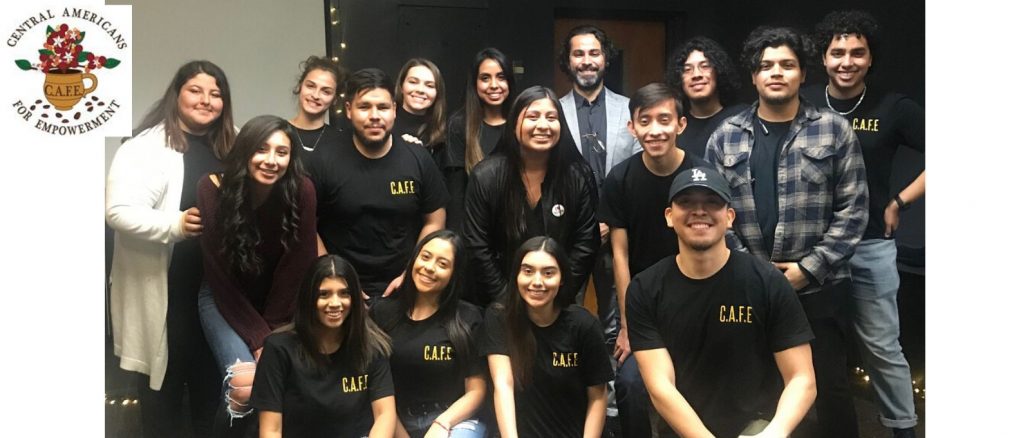
On 8 March 2019, The Nasiona‘s Founder/Editor-in-Chief, Julián Esteban Torres López, was the keynote speaker at “Cruzando Fronteras”—an event on immigration and border crossing, hosted by Central Americans for Empowerment (CAFÉ) at California State University, Chico. Julián’s speech tackled the role of storytelling as a tool of empowerment that can disrupt the status quo, confront caricatures, change politics by first changing culture, and help shape new paradigms.
Cruzando Fronteras was an event that hoped to provide a safe space to talk about the seeking of refuge and the many harsh trials and tribulations that our families have gone through, in order to inform others and each other on why anyone would want to take on the treacherous task of crossing (multiple) borders. CAFÉ wanted to provide these perspectives in an effort to better understand different experiences of struggle. Because more than that, it’s about one being able to persevere, about crossing that border, that boundary, in your own limitations and overcoming what has personally kept you back.
Central Americans for Empowerment (CAFÉ) is the first Central American student organization at California State University, Chico, and the 4th Chapter based off of UC Berkeley’s CAFÉ. They hope to provide a much needed space in which Central American students can come together and build lasting relationships. Apart from providing a fun and culturally diverse space, their goal is to adequately represent Central American students and foster an inclusive environment that is sensitive to the needs of this student population. CAFE’s primary focus is to educate students on Central American history and culture, build community, and facilitate an understanding of different Latinx experiences.
In this post, we showcase the following five poets out of dozens who took the stage to share their personal stories during the “Cruzando Fronteras” event: Alondra Adame, Eva Gonzalez, Gustavo Martir, David Cruz, and Diana Castellanos.
"El Silencio Divino," by Alondra Adame
One day in the late 1980s
my mother carried the first of her babies,
a deaf two-year-old, across the border,
slipping quietly through the fence.
The desert is still.
They are finally equals in the silence.
It’s a kind of purgatory, this stretch
of the journey. No one knows if
they are dead or alive. My father
lies awake, alone in Tijuana,
anxious for a call confirming my mother’s safety
aware of the dangers in the desert, remembering
the day he crossed in the trunk
of a car, sardined between sweaty
bodies of strangers who shared
his sweltering drive toward survival.
POET
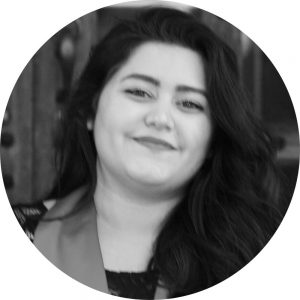
Alondra Adame
Alondra Adame is a graduate student at Chico State. She is entering the M.A. in English program, hoping to write a few books and read even more. A few topics she loves to speak and write about are mental health, LGBTQ issues, Chicanx culture, and events from her bittersweet life.
"I hope you are proud of me, mama," by Eva Gonzalez
I am going to give you the world mija, my dad would always say.
Coming home, sweat mixed with unspoken pain he felt for 50 years of hard labor.
He was 8 when he began working, and now his eyes are heavy, filled with sacrifice.
He is now almost 70 skin sagging, hands clasped in hopes for a brighter day.
Mija, this country is the country of opportunity, he loved to say.
My mother would smile as she ran her hands through my hair, love rushing through each stroke.
I never understood why people mocked my mother’s broken English.
I never understood why these laws were created to punish and separate families.
The years of suppression, and adapting to a country who hated the melanin in our skin.
the years of anxiety, hiding, and mental strife wasn’t enough for this country.
The blood of my siblings, the injustice, the constant fear of being detained.
The only transgression… wanting a better future.
I never thought that the country that I love, would take her from me.
When my mother was ripped away from me at age 11, I understood.
I remember holding on to her worn out green sweater, as the verdict was being read.
I held on to her even when the strength of ten men ripped her from me.
As she screamed and held my wet face in her shaking hands,
she managed to tell me, Te quiero mi angelito tienes que ser fuerte por mi.
I kept running to her, until I could no longer see her dark curly hair.
I whispered to an empty room, te quiero mama.
Every night I would kneel in the same position until my legs would go numb,
until my back began to ache, until my tears soaked my clothes… I would pray…
I would pray to a God who abandoned me,
and searched for her in abandoned places.
She wasn’t there to protect me from men who were hungry for a body to call their own.
I let them hit me, I let them dirty my body with their filthy hands as I searched for her.
I began to forget her scent; I could no longer remember what her voice was like.
Memories of her were erasing against my will… that was an indescribable pain.
She wasn’t there for my graduation or any of my achievements.
I still searched for her in the cheering faces that surrounded me.
She missed my birthday each year.
Each year as I blew the candle out, I wished for my family to be together again.
And each year I whispered what I couldn’t say the day I lost her,
Te quiero mama
POET

Eva Gonzalez
Eva Gonzalez is the daughter of Mexican immigrants. As a first generation student, she majored in Communication Public Affairs and minored in Diversity Studies. Her piece “I hope you are proud of me, mama” is inspired by personal experience in regards to family separation and deportation. She hopes to one day practice law and be able to work on the United States’s broken immigration system.
"Who Am I?" by Gustavo Martir
My name is Gustavo,
but who am I?
My parents are from Mexico,
but who am I?
I visit Mexico every now and then,
but who am I?
I was born in Los Angeles, CA,
but who am I?
I was raised in this country and its culture,
but who am I?
I learned about them,
but who am I?
I am both Mexican and American.
I have crossed the arbitrary border set before me by a hyphen.
I am Mexican American.
POET
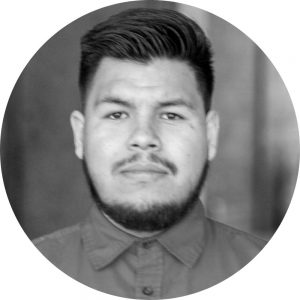
Gustavo Martir
My name is Gustavo Antonio Martir Luna. I am a First-Generation college student currently earning my master’s degree in psychology and will also be pursuing a doctorate. I identify as Mexican American, combining both of my cultures. The piece I wrote was the beginning formation of my “dual consciousness,” as W.E.B. Du Bois called it. “Who am I?” is dedicated to all the people trying to reconcile their inner cultural dualities.
"Infierno," by David Cruz
Worn, relaxed
river rocks
welcome the hops;
skip the Lempa’s
crisp, constant stream.
Suddenly remembering life at stake,
nightmares interjecting on childhood dreams.
Baking in the sun, despite my will
old memories come,
amongst serene greens,
molten colored meadows.
I rather not recount
black smoke thick in the air,
the smell of plantations
burning down everywhere,
blood stains where
human remains lie.
People fleeing politics,
death of the innocent
complements ideological conflict.
A fierce eruption occurred
in my beloved land of volcanoes,
pero la explosión solo era la guerra
de guerrillas contra el ejército.
I can’t tell whether it’s good or bad:
it seems to get warmer the farther away I get
from that burning countryside
POET
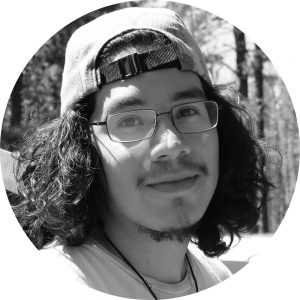
David Cruz
Originally from Los Angeles, David recently graduated from CSU, Chico with a degree in English. He uses his writings to highlight the voices of the historically marginalized and oppressed, and plans to continue educating on the power of storytelling wherever he may go.
"Gracias a la Vida," by Diana Castellanos
“Gracias a la vida, que me a dado tanto.” – Mercedes Sosa
Mami. Papi. Gracias.
You crossed deserts and borders of water,
So my body could be here.
Mami. Papi. Gracias.
Part of you drowned that day, mami, you were just 14 years young.
A child making adult decisions. I know you don’t talk about those visions,
I know we don’t talk much.
Mami. Papi. Gracias.
Because of you, yo se como chingarle en la pisca!
Those grapes got nothing on me. You try working 120 degrees in the middle of the desert!
Y’all can’t, but me, my mami, and my papi… we did.
I am here because you were there, and that’s not fair because this land was here before
whites were here and it is clear that this nation doesn’t play by their own rules.
Mami. Papi. Gracias.
Because I live the struggle, my existence is the insistence of the people.
The resistance of a whole bunch of hijos de la chingada.
We don’t need assistance, we know the distance between here and where y’all think we
need to go – but you know?
We ain’t going anywhere.
POET
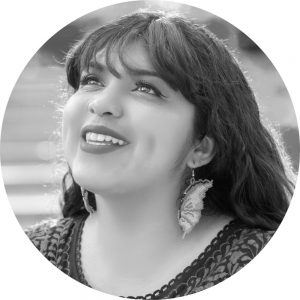
Diana Castellanos
Diana Castellanos graduated from Chico State. She comes from the Coachella Valley where she has picked grapes and seen her community thrive off agriculture. She hopes to pursue higher education and bring it back home. As Atmosphere once said, “roam if you must, but come home when you’ve seen enough.”
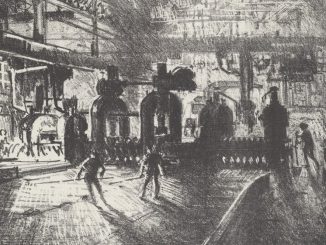
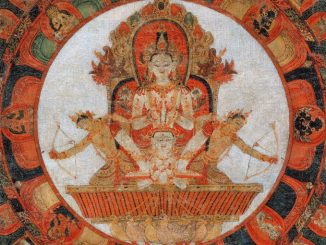
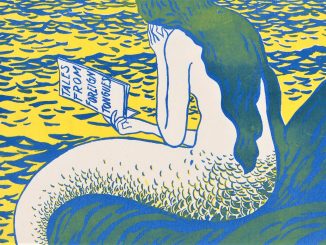
1 Trackback / Pingback
Comments are closed.